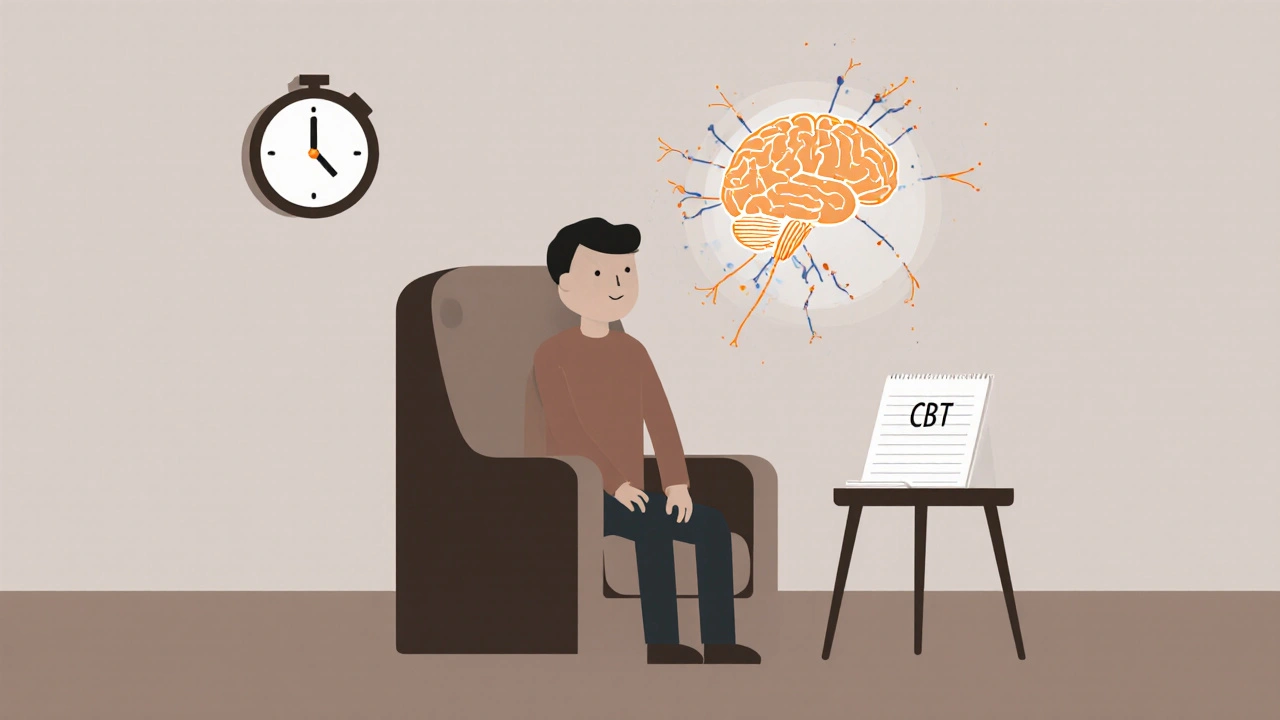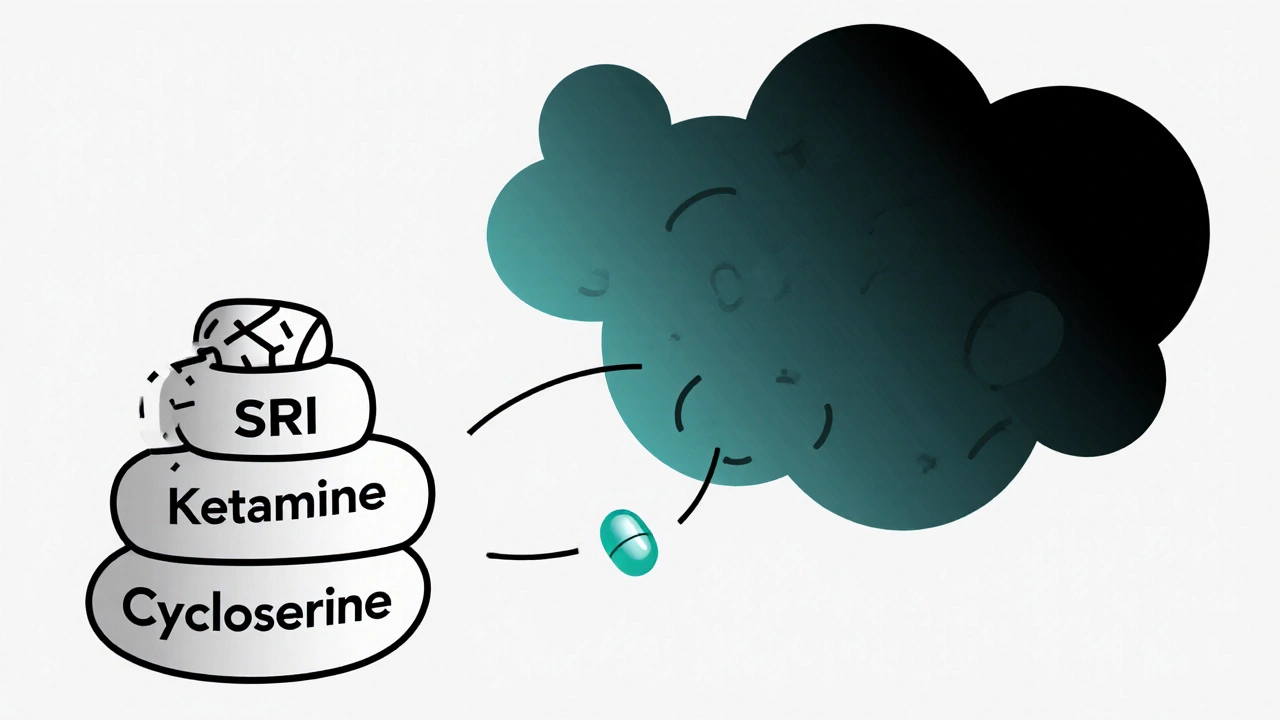Depression doesn’t always respond to standard antidepressants. For millions of people, SSRIs and SNRIs either don’t work well enough or come with side effects that make them hard to tolerate. That’s where newer, off-label approaches like cycloserine are starting to catch attention-not as a standalone cure, but as a possible helper when used alongside other treatments.
What is cycloserine, really?
Cycloserine isn’t a new drug. It was first developed in the 1950s as an antibiotic to treat tuberculosis, especially drug-resistant strains. It works by interfering with bacterial cell wall formation. But in the 1990s, researchers noticed something strange: when given to animals, it seemed to improve learning and memory. Further study revealed it acted on the brain’s NMDA receptors, the same ones targeted by ketamine and other fast-acting antidepressants.
Unlike SSRIs that take weeks to show effects, cycloserine works fast-sometimes within hours. It doesn’t boost serotonin or norepinephrine. Instead, it enhances glutamate signaling, which plays a key role in neuroplasticity: the brain’s ability to rewire itself. This is critical because depression isn’t just about low mood-it’s tied to weakened connections in brain regions that handle emotion, memory, and decision-making.
How could cycloserine help with depression?
The idea isn’t to use cycloserine to lift mood directly. Instead, it’s being tested as a tool to make psychotherapy more effective. Think of it like a chemical booster for therapy sessions.
In clinical trials, people with treatment-resistant depression who took a low dose of cycloserine before cognitive behavioral therapy (CBT) showed faster improvement than those who took a placebo. One 2021 study published in the Journal of Clinical Psychiatry found that patients receiving cycloserine alongside CBT had a 40% greater reduction in depressive symptoms after six weeks compared to those doing CBT alone.
The theory? Cycloserine helps the brain lock in new, healthier thought patterns learned during therapy. If you’re learning to challenge negative beliefs in CBT, cycloserine may help your brain treat those new thoughts as more important than the old, depressive ones. It’s not magic-it’s neuroscience.
What does the research actually show?
Several small trials have looked at cycloserine for depression, but results aren’t uniform. Some show clear benefit; others show no difference from placebo. Why the inconsistency?
One major factor is dosage. Cycloserine has a narrow window of effectiveness. Too little, and it does nothing. Too much, and it can block NMDA receptors instead of enhancing them-making symptoms worse. Most successful studies use doses between 50 and 250 mg, taken just before therapy sessions, not daily.
Another issue is timing. Cycloserine seems most helpful when paired with exposure-based therapies-like CBT or exposure therapy for trauma-related depression. It doesn’t appear to help much when used alone or without structured psychological support.
A 2023 meta-analysis in Molecular Psychiatry reviewed 12 randomized trials and concluded that cycloserine has a small but statistically significant effect on reducing depressive symptoms when used as an adjunct, especially in patients who haven’t responded to at least two prior antidepressants.
Who might benefit most?
Cycloserine isn’t for everyone. It’s being studied mainly for:
- People with treatment-resistant depression (didn’t respond to two or more antidepressants)
- Those already in therapy and looking to speed up progress
- Patients with depression linked to trauma or anxiety disorders
- Individuals who can’t tolerate the side effects of other medications like ketamine or esketamine
It’s not recommended for people with a history of seizures, kidney disease, or severe liver impairment. It can also cause dizziness, headache, or mild confusion-especially at higher doses.

How does it compare to other fast-acting options?
There are other drugs being used to treat depression quickly: ketamine, esketamine, and even psychedelics like psilocybin. How does cycloserine stack up?
| Treatment | Delivery Method | Onset of Effect | Duration of Effect | Requires Medical Supervision? |
|---|---|---|---|---|
| Cycloserine | Oral pill | Hours to days | Days to weeks (with therapy) | No |
| Esketamine (Spravato) | Nasal spray | Hours | Days to weeks | Yes |
| Ketamine (IV) | Infusion | Hours | Days to weeks | Yes |
| Psilocybin (in trials) | Oral capsule | Days | Weeks to months | Yes |
Cycloserine’s biggest advantage? It’s taken orally, doesn’t require clinic visits, and is far cheaper than ketamine or esketamine. A 30-day supply costs under $20 in generic form. But its downside is that it only works if paired with therapy-and therapy isn’t always accessible.
Is it approved for depression?
No. Cycloserine is FDA-approved only for tuberculosis. Its use in depression is entirely off-label. That means doctors can prescribe it, but insurance won’t cover it for mental health. Most patients pay out of pocket.
Because it’s generic and inexpensive, big pharmaceutical companies aren’t funding large-scale trials. That leaves the research to academic institutions and small nonprofits, which move slower and have less funding. As a result, while early results are promising, cycloserine hasn’t yet made it into clinical guidelines.
What are the risks?
Side effects are usually mild: dizziness, nausea, headache, and occasional anxiety. But because it affects the brain’s glutamate system, there’s a small risk of seizures-especially in people with a history of epilepsy or brain injury.
It can also interact with other medications that affect the nervous system, including benzodiazepines, anticonvulsants, and some antibiotics. Never take it with alcohol. Long-term safety data is limited since most trials last only a few weeks.
It’s not a replacement for proven treatments. If you’re struggling with depression, don’t stop your current medication to try cycloserine on your own. Always talk to a psychiatrist first.

Where is the research headed?
Researchers are now testing cycloserine in combination with newer forms of therapy, like virtual reality exposure for trauma-related depression. Others are looking at whether it can help prevent relapse after successful treatment.
A major 2025 trial, funded by the National Institute of Mental Health, is currently recruiting 400 patients across five U.S. sites to test cycloserine paired with AI-guided CBT delivered via app. Early pilot data suggests patients using the combo were twice as likely to maintain improvement after six months compared to those using the app alone.
The goal isn’t to replace antidepressants or therapy. It’s to make them work better, faster, and for more people.
What should you do if you’re considering it?
If you’ve tried multiple antidepressants without success and are in therapy, talk to your psychiatrist about cycloserine. Bring up the research. Ask:
- Is my depression treatment-resistant?
- Am I a candidate for adjunct therapy?
- Can you refer me to a provider who has experience with this approach?
Don’t try to get it from online pharmacies or unregulated sources. The quality and dosage can be unreliable. Only use it under medical supervision.
It’s not a miracle drug. But for some people stuck in a cycle of depression that won’t budge, it might be the missing piece.
Can cycloserine be used as a standalone treatment for depression?
No. Current evidence shows cycloserine doesn’t work well on its own. It’s designed to enhance the effects of psychotherapy, especially cognitive behavioral therapy. Taking it without therapy is unlikely to help and could even reduce its effectiveness.
How long does it take for cycloserine to start working?
When taken before a therapy session, cycloserine can enhance learning and emotional processing within hours. But noticeable changes in mood usually appear after several sessions over a few weeks. It’s not an instant fix-it’s a tool to make therapy stick.
Is cycloserine safe for long-term use?
Long-term safety data is limited. Most studies last 6 to 12 weeks. While no major safety issues have emerged in this timeframe, there’s not enough data to say whether using it for months or years is safe. It’s meant for short-term, targeted use during therapy.
Can I take cycloserine with my current antidepressant?
In most cases, yes-but only under a doctor’s supervision. Cycloserine doesn’t interfere with SSRIs or SNRIs, but it can interact with other medications like benzodiazepines or anticonvulsants. Always tell your doctor about every medication and supplement you’re taking.
Why isn’t cycloserine more widely used if it’s cheap and effective?
Because it’s generic, there’s no financial incentive for drug companies to invest in large trials or marketing. Also, it only works with therapy, and therapy access is still limited in many areas. Until more robust clinical guidelines are established, most doctors won’t prescribe it routinely.
Next steps if you’re interested
If you’re considering cycloserine, start by talking to a psychiatrist who specializes in treatment-resistant depression. Ask if they’ve used it before or know of a clinic running trials. If you’re in the U.S., check ClinicalTrials.gov for active studies recruiting participants.
Don’t rush. This isn’t a quick fix. But for those who’ve tried everything else, it might be the first real step forward in years.

Scott Horvath
October 28, 2025 AT 14:25